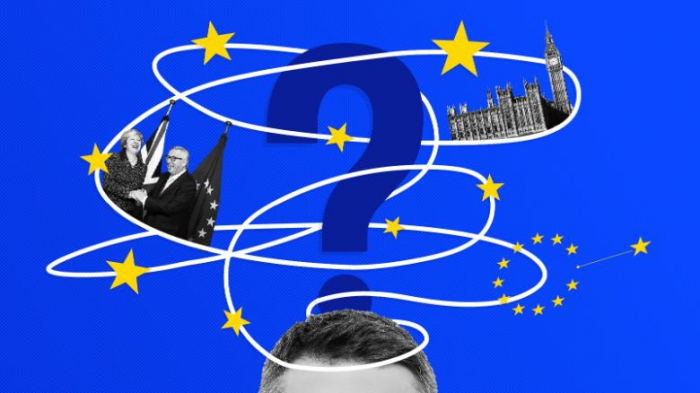The hard right's numbers won't be nearly enough to command the Brussels-based locus of European democracy, but its combined forces could throw another spanner into the Union's already challenged machinery.
Thus, all the more urgent is the EU's contorted mission to win back the trust of its citizens.
Obviously, its original narrative, one that powered it through the postwar decades -- namely of peace through cooperation and economic integration on a united continent -- no longer resonates with many Europeans, particularly the young. In our age, to many the rationale of relative prosperity and no war simply doesn't justify handing over precious national sovereignty to a supranational body far from capital cities.
The EU has strained to replace this grand postwar narrative with another overarching, big-ticket paradigm linked to Europe's destiny. But none of them were convincing.
What the EU needs is to think like a realist rather than an idealist.
Europe, I believe, can best sell itself today by running on its impressive oeuvre of concrete, nuts-and-bolts accomplishments. In other words, the EU and its proponents must throw humility to the wind and convey as clearly as possible all that it does for its citizens -- how it positively impacts the quality of their lives on a daily basis.
This doesn't require clever PR jingles or blue and yellow balloons. Rather, a straightforward accounting of the perks, in down-to-earth language backed with evidence. The EU's citizens should know what they owe to the EU, and what those outside it, as soon will be the UK's case, do not have.
Of course, such a campaign can start with open borders and visa-free travel within the EU -- which shouldn't be news to anybody. Yet, it affects so many of us and reflects the liberal spirit of the EU like nothing else.
One doesn't have to be advanced in years to remember the days of visas and annoying border controls that accompanied every vacation or business trip abroad. And, even if you're not one of them, think about the importance of border-free Europe for the 17 million Europeans that live or work in an EU country other than their own.
Many today take traveling seamlessly through Europe for granted -- a mistake. It is reversible, as immigration-panicked officials in many EU states have recently illustrated all too clearly.
One needn't have a degree in economics to appreciate the value of being part of the world's biggest single market. But how many people know that there are 56 million jobs within the EU that depend on trade created by the single market? And thanks to EU-wide competition, for example, people can choose their energy provider and switch telecom companies in a fast and easy way.
Finland's European Consumer Center counts a pithy "25 Consumer Benefits from the EU Single Market." This kind of list should be part of a pro-EU counter offensive, perhaps turned into posters or TV and Internet ads.
But more crucial than these are the vast array of measures that most Europeans don't know about.
How many EU citizens are aware, for example, that on February 19, the EU agreed to the first-ever emissions standards in Europe for trucks that would reduce carbon dioxide emissions from new trucks and buses by 30 percent before the year 2030, compared to 2019?
In the last five years, the EU has been the driving force in Europe on climate protection and renewable energy expansion, making Europe a global leader in these fields. Last year, the EU agreed that renewables must make up 32% of energy consumed in Europe by 2030 (the target is binding) and that by then there be a 33% increase in energy efficiency.
Consumer protection is a glimmering jewel in the EU's crown. Europeans benefit from the highest health, hygiene and food standards in the world. All imported products must comply with EU rules. The ingredients labels on all of our packaged food: the result of EU regulation.
Every young person should know that through the EU's "roam-like-at-home" rule, you can use your mobile phone while travelling outside your home country in any EU country. You don't have to pay additional roaming charges.
And EU-formulated Air Passenger Rights protect passengers by making it easier to get compensation after delays and cancellations. And EU competition measures have cut air travel costs by 90% since 1993.
These bits and pieces are only the tip of the iceberg once you begin searching.
The EU itself could do a whole lot more to publicize these facts. Their substance is powerful enough to overcome the perennial red herrings of EU-dictated cucumber size and the shape of bananas.
But the real onus lies on Europe's mainstream politicos, almost all of whom are EU fans but who, in the past, have bashed the EU to score easy points in domestic campaigns. They've behaved as if the EU were an independent actor, a Brussels-based autocracy imposed on them. Of course, they are the EU, in the parties of the European Parliament, and in their representatives in commission and the council.
Now they're the ones who have to do the heavy lifting. Yet we're not hearing it as loud and clear as we must over the shouting of the rabblerousing right.
We don't need a grand narrative anymore, but cold, hard facts and convinced Europeans who are willing to take on the populist Euroskeptics. That means taking off the gloves and entering the brawl.
Paul Hockenos is a Berlin- and New York–based writer and political analyst who has been working in Germany and across Central and Eastern Europe since 1989.
Read the original article on CNN.
More about: Europe
















































